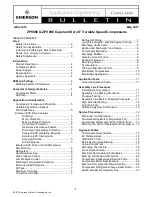
AGL_HP_ST_YHK1E_E_Rev02
23
In a failure mode, the discharge gas temperatures can even get higher. Care must be taken to ensure
that wiring or other materials that could be damaged by these temperatures do not touch the shell.
5.12 Pumpdown cycle
WARNING
Vacuum operation! Creation of a flammable mixture! Fire hazard!
During
operation in vacuum a flammable mixture can form inside the system. Extreme
attention shall be paid to system tightness. Prevent ambient air from entering
the system.
CAUTION
Vacuum operation! Compressor damage!
Compressor operation outside
the operating envelope is not allowed.
A pumpdown cycle to control refrigerant migration may have to be used for several reasons, for
example when the compressor is located outdoors without any housing so that cold air blowing over
the compressor makes the crankcase heater ineffective.
If a pumpdown cycle is used, a separate external check valve must be added
. The scroll
discharge check valve is designed to stop extended reverse rotation and prevent high-pressure gas
from leaking rapidly into the low side after shut-off. The check valve might in some cases leak more
than reciprocating compressor discharge reeds, normally used with pumpdown, causing the scroll
compressor to recycle more frequently. Repeated short cycling of this nature can result in a low oil
situation and consequent damage to the compressor. The hysteresis of the low-pressure control
differential has to be reviewed since a relatively large volume of gas will re-expand from the high side
of the compressor into the low side after shutdown.
For pressure control
setting, never set the low-pressure limiter to
shut off outside of the
operating envelope.
To prevent the compressor from running into problems during such
faults as loss of charge or partial blockage, the low-pressure limiter shall not be set lower
than the minimum suction pressure allowed by the operating envelope.
5.13 Minimum run time
Emerson recommends a maximum of 10 starts per hour. There is no minimum off time because
scroll compressors start unloaded, even if the system has unbalanced pressures. The most critical
consideration is the minimum run time required to return oil to the compressor after start-up. To
establish the minimum run time, a sample compressor equipped with external oil sight glass is
available from Emerson. The minimum on time becomes the time required for oil lost during
compressor start-up to return to the compressor sump and to restore a minimal oil level that will
ensure oil pick-up through the crankshaft. Cycling the compressor for a shorter period than this, for
instance to maintain very tight temperature control, will result in progressive loss of oil and damage
to the compressor.
5.14 Shut-off sound
Scroll compressors incorporate a device that minimizes reverse rotation. The residual momentary
reversal of the scrolls at shut off could cause a clicking sound. It is entirely normal and has no effect
on compressor durability.
5.15 Supply frequency and voltage
There is no general release of standard Copeland Scroll compressors for use with variable speed
AC drives. A number of considerations must be taken into account when applying Scroll compressors
with variable speed, including system design, inverter selection, and operating envelopes at various
conditions. Only frequencies from 50 to 60 Hz are acceptable. Operation outside this frequency range
is possible but should not be done without specific Application Engineering review. The voltage must
vary proportionally to the frequency.
If the inverter can only deliver a maximum voltage of 400 V, the amps will increase when the speed
is above 50 Hz, and this may give rise to nuisance tripping if operation is near the maximum power
limit and/or compressor discharge temperature limit.
The last letter of the motor code indicates which frequency and voltage must be applied
– see
Chapter 2.2
.
Summary of Contents for Copeland Scroll YH16K1E
Page 4: ...AGL_HP_ST_YHK1E_E_Rev02 9 References 33 DISCLAIMER 33 ...
Page 5: ......
Page 39: ...34 AGL_HP_ST_YHK1E_E_Rev02 ...













































